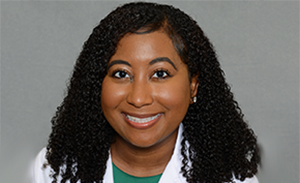 Dr. Bria Carrithers, PGY-2by Dr. Bria Carrithers, PGY-2
Dr. Bria Carrithers, PGY-2by Dr. Bria Carrithers, PGY-2
Since beginning residency, I’ve always admired those resident and attending physicians who consistently display the art of humanistic care in their care of patients and I’ve strived to find ways to incorporate those principles into my practice as well. The clinical responsibilities we have set before us as physicians can often feel enormous, perhaps most noticeably during intern year. Under the weight of responsibility that comes with being a physician and the pressures of caring for patients, it is all too easy to lose sight of what is important. Have you ever wondered how the greatest physicians continue to demonstrate the person-centric ideals of humanism each day despite the humdrum routines of working in healthcare today? Are there ways to incorporate discussions on the imperative value of humanism in medicine within our busy workdays and, specifically and perhaps most crucially, in our role as educators training the physicians of the future?
As we set forth to create in ourselves and in future generations a profession of humanistic physicians, I’ve found that the wisdom of the past can so often inspire the future. Any investigation into the history of humanism as it has developed at UAB invariably leads to one physician who embodied so many of its core principles. Dr. Tinsley R. Harrison devoted much of his career to medical education, but it was not solely the training of intellect that he aimed to promote. Dr. Harrison developed a vision of medical universities as places where not only brilliant, but also compassionate minds would be cultivated. Harrison’s focus on understanding the patient outside of their medical presentations was key to his overall success as a general internist. This key principle of humanistic care of truly learning our patients is essential. As our focus shifts, our questions shift with them: Who is my patient? What was their life like prior to getting sick? What are their social support systems, if any? How can we get them back to their previous level of functionality and, if unable, how can we make them the most comfortable? Compassion can provide us with perspective and that is essential if we aim to establish and grow rich, meaningful patient-physician relationships.
After identifying the impact of patient-physician relationships, we must remain reflective of our past patient experiences in hopes to further cultivate these vital connections. If we do not recognize our patients and their life experiences, how can we ever hope to connect with them? Acknowledging and understanding the human experience provides our patients with comfort that we are advocating for them as an individual and not myopically focusing on the diseases that fail to define who they are as a person. Incorporating humanism into our patient care is not forced but, instead, displayed in our daily encounters with patients and allows others to model our example. Furthermore, exhibiting this approach to our learners lays the foundation for them to blossom into humanistic physicians as well.
In closing this letter, I leave you with the final remarks of Dr. Frances Peabody in his address to a class of Harvard Medical students in 1926: “One of the essential qualities of the clinician is interest in humanity, for the secret of the care of the patient is in caring for the patient.” I first heard this quote from a mentor of mine, Dr. Robert Centor, which I believe serves as a beautiful example of the importance of instilling humanistic teaching into physician education. It is only in finding balance between our intellectual curiosity and our commitment to patient care that we can provide care to patients who desire to be heard, seen, and understood during their most vulnerable times.
“No greater opportunity, responsibility, or obligation can fall to the lot of a human being than to become a physician. In the care of the suffering, [the physician] needs technical skill, scientific knowledge, and human understanding. [The physician] who uses these with courage, with humility, and with wisdom will provide a unique service for [their] fellow man and will build an enduring edifice of character within [themselves]. The physician should ask of [their] destiny no more than this, [they] should be content with no less.” - Tinsley Randolph Harrison, 1950